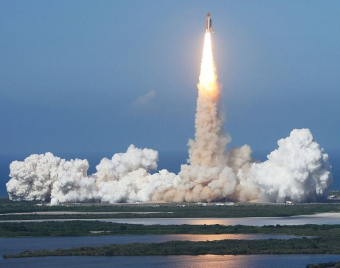
A Stupid Thing to Say?
That’s not really an entirely stupid statement. Imagine you’re on a chair with wheels. How can you move if you don’t push on something? But the man didn’t fully appreciate the rocket does push on something—or, rather, something pushes on the rocket—its fuel.
To Illustrate
Imagine one of those kids’ cherry bombs, a quarter-sized explosive kids set off on various occasions. Imagine a cherry bomb tied with a very sewing thread, suspended from a tree limb. The fuse is lit! Right next to the bomb, at which location would it be safe for someone to stand? Not one. Nowhere north, south, east, or west—up or down—would be safe. That’s because a bomb blows up in all directions.
Directing the Blow
It’s similar for rocket fuel. The difference is, rocket fuel is intentionally constrained to blow in one direction only. The fuel is surrounded on all sides by a strong metal surface, with the exception of a single opening pointing away from the rocket. Yes, directing the blow helps a rocket fly in space.
Analogy to a Cannon
In a cannon, the ball is fired and travels at a high speed toward its target. But the cannon itself exerts a strong backward force or recoil. Recoil is not too bad, because the explosion is moderately small and the weight of the ball is relatively little. In a rocket, the quantity of fuel is immense. As was true for the cannon, the rocket recoils, but with much more impressive force.
Below, in the YouTube video, is clear evidence recoil is real. Skeptics: ask yourselves, What is the cannon pushing against to make it go backward?
A Rocket Fly in Space?
Thus a rocket launched from Cape Canaveral spews out a tremendous amount of flaming hot combustion products from the controlled explosion going on within its innards. This provides the recoil or thrust needed to make a rocket fly—for takeoff and a successful flight.
Note: You might also enjoy Where Does Light Go? Why is the Universe Dark?
← Back to Math-Logic-Design
← Home